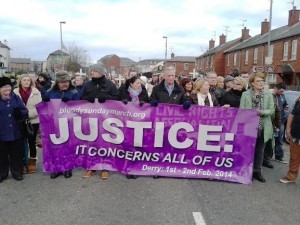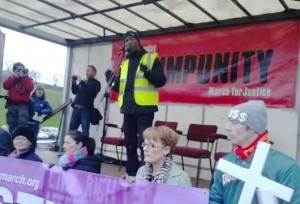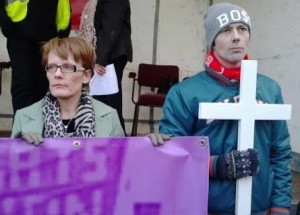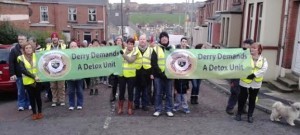PSNI officers involved in the murder investigation into the Bloody Sunday killings have been called on to begin the process by interviewing “the accused.”
The call came from veteran republican Bernadette McAliskey who was speaking at a rally at Free Derry Corner in the Bogside at the end of the March for Justice to commemorate the 42nd anniversary of Bloody Sunday.
The PSNI announced last Thursday that as part of the its investigation, it was to begin interviewing over 1,000 witnesses who gave evidence at the Saville Inquiry “in tandem” with 250 British soldiers.
They have also called on anyone with information who did not give evidence at the inquiry to come forward.
Stating she would “not be holding my breath for justice,” Ms McAliskey said by starting the interview process with “the accused” it could possibly save “a lot time, a lot of effort and a lot of money.”
Referring to the PSNI investigation, Ms McAliskey said: “If you are one of the thousand -the police will be round!
“What are they going to ask you? What you have already told Saville!
“It seems to me that at this stage of the proceedings, if I were the PSNI I would start with the accused. I would actually start with the soldiers – that would save a lot of time, a lot of effort and a lot of money – because I have a sneaky suspicion if you started with the foot soldiers who are carrying the blame and carrying the can for the whole British Establishment, they might plead guilty on the spot and start to talk about who actually said what to whom and who bears the responsibility.”
Ms McAliskey concluded: “So if the police come round to you asking you to make a statement to them, feel free to say ‘Bernadette said: why don’t you start with the soldiers!”
Guest speaker, Stafford Scott, from the Mark Duggan Campaign, Broadwater Farm, Tottenham in London, said the fight for justice for the Bloody Sunday victims had inspired many campaign groups around the world.
Mr Scott said “if there was no justice there would be no peace.”
Mr Scott said: “It is an honour and a pleasure to be here with you here today. I was 12 years old when the Bloody Sunday travesty happened and I have grown and watched and listened – and watched as you fought for justice.
“And I want you to understand and know that the pain that you suffer here is being felt in many other communities, the pain that you suffered here has helped to give strength to many other communities.
“In the community I come from, which is Broadwater Farm in Tottenham, the Tottenham community, the black community, an oppressed community, a seldom heard community – we have had four people killed in the last 28 years.
“Every now and then we erupt, every now again we rise up because of what has happened to us.
“We have tacitly supported your struggle – the struggle of the republicans – for a long, long, time – so it is an honour to be able to come here and share that support and solidarity with you all.”
Following a minute’s silence. the names of the Bloody Sunday dead and wounded were read by Damien Donaghy, who was shot and injured on the day.
The crowd dispersed peacefully after the playing of the National Anthem by the Parkhead Republican Flute Band from Glasgow, one of a number of Scottish bands which took part in today’s march.
Earlier, several thousand people retraced the route of the original 30 January 1972 parade in the March for Justice from Central Drive in Creggan to Free Derry Corner.
Relatives of some of those killed on Bloody Sunday and a number of the wounded walked at the head of the march behind a banner entitled: “Justice: It Concerns It All” followed by young people carrying 14 large white crosses, representing those killed 42 years earlier.
On the approach to Free Derry Corner, the parade halted briefly in Rossville Street to observe a minute’s silence prior to the laying of floral tributes at the Bloody Sunday memorial by Geraldine Donaghy, niece of Gerard Donaghy, and Colin Patterson, bandsman with the Parkhead Republican Flute Band.
A number of campaign groups were represented, including family members from the “Ballymurphy 11” and “The Disappeared.”
Also represented was the group campaigning for the setting up of a detox unit in Derry.
Among those who walked with the group were family members of missing Galliagh teenager Andrew Quigley.
The 19-year-old has not been seen since leaving a friend’s birthday party in the early hours of Saturday 18 January last. Some of his personal items were found at 7.40am later that day.
Andrew’s mother Colette revealed he had been battling a drug and alcohol addiction and when he went seeking helping had “the door shut in his face” and told help would only provided when he quit his habits.
Since then, other families have revealed their loved ones encountered similar situations before also taking their lives.
Andrew’s family continue to search the River Foyle and have vowed to continue until he is found.
Tags:










